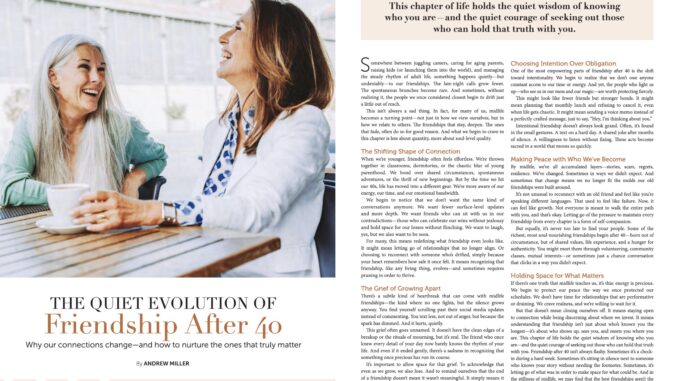
By Andrew Miller
“This chapter of life holds the quiet wisdom of knowing who you are—and the quiet courage of seeking out those who can hold that truth with you.”
Somewhere between juggling careers, caring for aging parents, raising kids (or launching them into the world), and managing the steady rhythm of adult life, something happens quietly—but undeniably—to our friendships. The late-night calls grow fewer. The spontaneous brunches become rare. And sometimes, without realizing it, the people we once considered closest begin to drift, falling a little out of reach.
This isn’t always a sad thing. In fact, for many of us, midlife becomes a turning point—not just in how we view ourselves, but in how we relate to others. The friendships that stay, deepen. The ones that fade, often do so for good reason. And what we begin to crave in this chapter is less about quantity, more about soul-level quality.
The Shifting Shape of Connection
When we’re younger, friendship often feels effortless. We’re thrown together in classrooms, dormitories, or the chaotic blur of young parenthood. We bond over shared circumstances, spontaneous adventures, or the thrill of new beginnings. But by the time we hit our 40s, life has moved into a different gear. We’re more aware of our energy, our time, and our emotional bandwidth.
We begin to notice that we don’t want the same kind of conversations anymore. We want fewer surface-level updates and more depth. We want friends who can sit with us in our contradictions—those who can celebrate our wins without jealousy and hold space for our losses without flinching. We want to laugh, yes, but we also want to be seen.
For many, this means redefining what friendship even looks like. It might mean letting go of relationships that no longer align. Or choosing to reconnect with someone who drifted, simply because your heart remembers how safe it once felt. It means recognizing that friendship, like any living thing, evolves—and sometimes requires pruning in order to thrive.
The Grief of Growing Apart
There’s a subtle kind of heartbreak that can come with midlife friendships—the kind where no one fights, but the silence grows anyway. You find yourself scrolling past their social media posts instead of commenting. You text less, not out of anger, but because the spark has dimmed. And it hurts, quietly.
This grief often goes unnamed. It doesn’t have the clean break of a breakup or the rituals of mourning, but it’s real. The friend who once knew every detail of your day now barely knows the rhythm of your life. And even if it ended gently, there’s a sadness in recognizing that something once precious has run its course.
It’s important to allow space for that grief. To acknowledge that even as we grow, we also lose. And to remind ourselves that the ending of a friendship doesn’t mean it wasn’t meaningful. It simply served its season.
Choosing Intention Over Obligation
One of the most empowering parts of friendship after 40 is the shift toward intentionality. We begin to realize that we don’t owe anyone constant access to our time or energy—and yet, the people we do let up—those who see us in our mess and magic—are worth protecting fiercely.
This might look like letting bad friendships die with quiet grace. It might mean planning that monthly brunch and refusing to cancel it, even when life gets chaotic. It might mean sending a voice memo instead of a perfectly crafted message, just to say, “Hey, I’m thinking about you.”
Intentional friendship doesn’t always look grand. Often, it’s found in the small gestures. A text on a hard day. A shared joke after months of silence. A willingness to listen without fixing. These acts become sacred in a world that moves so quickly.
Making Peace with Who We’ve Become
Midlife, we realize, we all accumulate layers—stories, scars, regrets, resilience. We changed. Sometimes in ways we didn’t expect. And sometimes that change means we no longer fit the molds our old friendships were built around.
It’s not unusual to reconnect with an old friend and feel like you’re speaking different languages. That used to feel like failure. Now, it can feel like growth. You’re showing up as the person you are today, not the person they once knew. And that’s okay. Letting go is the pressure to maintain every friendship from every chapter is a form of self-compassion.
The friendships that fit now? They feel deeper and wider—built on the richest, most nourishing versions of life you have to offer. Some may be fewer, but they’re gold. They aren’t built on nostalgia. They’re built on mutual respect, shared history, and hunger for connection that feels less about proving and more about being.
And the friends who remain? They’re the ones who carry the silences and the milestones with equal tenderness. Friendships aren’t the loudest—they’re the ones that simply say, Let them.
Read the article in LIVING WELL.


